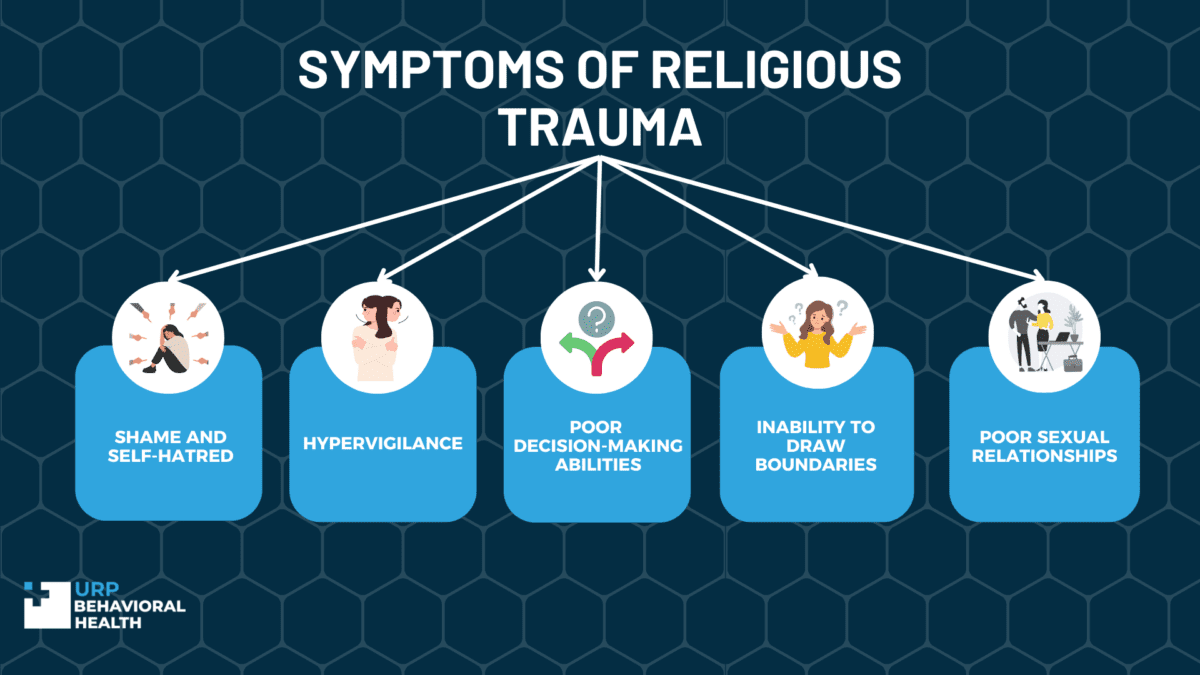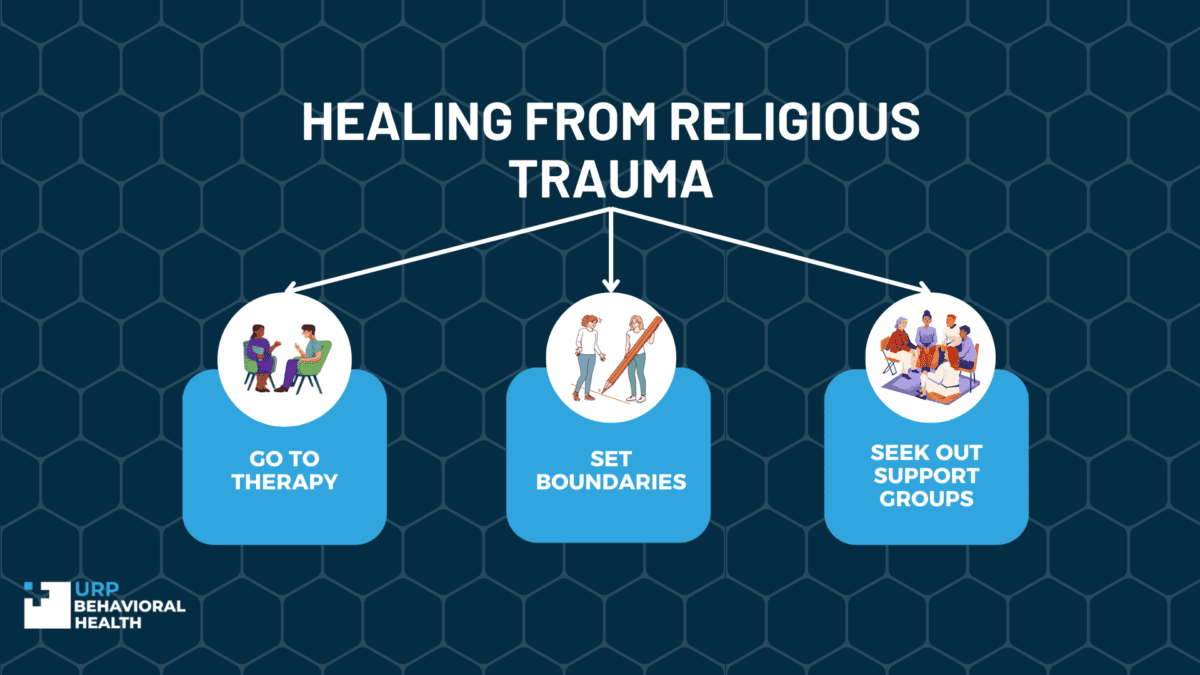What You Should Know About Religious Trauma

For some, spirituality and religion can be a source of comfort, allowing them to heal from past trauma. But for others, religion can become a source of trauma and abuse. In a study on why people leave religion, researchers found that almost a fifth of the sample reported religious trauma. This is when a traumatic event, such as physical or sexual abuse, occurs in connection to religious settings or beliefs.
And because religion is a delicate topic, it can be difficult for people to come forward and seek help. With so many people in the US identifying as religious, it’s worth looking at what religious trauma and spiritual abuse look like and how to start healing.

What is Religious Trauma?
When your experience with religion has been abusive, stressful, or damaging to the extent that it causes mental or behavioral strain, it’s referred to as religious trauma. Traumatic religious experiences can negatively impact your physical, mental, or spiritual health. Because religious trauma takes place over a long period, it has a lasting impact on your identity and self-worth.
Interactions with the religious community can cause you to believe that you’re sinful and will be subject to divine punishment, even after you’ve left the faith or its practices.
What is Religious Trauma Syndrome?
While the term isn’t included in the APA’s fifth edition of the DSM, it has started gaining traction among practitioners. Religious trauma syndrome is used to describe people who’ve experienced religious trauma or spiritual abuse.
People who struggle with religious trauma syndrome are usually those who’ve left behind a controlling religion. Or, it can include people who no longer adopt the beliefs used by religious leaders to indoctrinate them. Once you abandon a rigid belief system, it can be difficult to acclimate to an independent life without someone who provides ‘spiritual guidance.

Symptoms of Religious Trauma
Shame and Self-Hatred
Some religious communities propagate the idea that certain people are unworthy of affection, labeling them as inherently evil. And if the community considers some identities to be superior, it can result in discrimination or marginalization. This, in turn, contributes to feelings of depression, shame, low self-esteem, or even suicidal ideation.
Hypervigilance
When your religion depicts an image of a malevolent and vindictive god who punishes people when they don’t meet a certain moral standard, it can contribute to feelings of anxiety. In other communities, members propagate apocalyptic concepts suggesting that the world is nearing its end. Constant exposure to such ideas can lead to persistent anxiety and fear of perceived harm.
Poor Decision-Making Abilities
If you’ve been a member of a dogmatic religious community, it’s likely that you’re used to making decisions based on specific religious norms. Once you decide to leave the community or draw boundaries in your relationship with these institutions, you may have difficulty in making decisions.
Inability to Draw Boundaries
Being a member of a religious community means having to receive some feedback on how you live. In fact, some communities may set expectations for volunteering and charity. These can be considered beneficial aspects of religion, but only if you set boundaries and the community respects them.
Without these boundaries, you may have a hard time finding your own sense of identity without the approval of others. Similarly, you may have a hard time putting yourself first or saying ‘no’ to duties or responsibilities.
Poor Sexual Relationships
When religious communities emphasize purity culture, they fail to prepare members for healthy sexual relationships. It’s common for people with religious trauma to practice abstinence until they’re married. Because of this, they may struggle to cope with realities about sexual performance or desires that don’t fall in line with their expectations.
What is Spiritual Abuse?
This is when someone in a position of authority attempts to exert control over you using faith or religion. You can experience spiritual abuse in a personal relationship or within a religious organization. Remember that spirituality should provide you with peace, comfort, and community, and if that’s not the case, you may be the victim of spiritual abuse.
A major sign of spiritual abuse is if a religious leader, romantic partner, or family uses religious beliefs to control different aspects of your life. This includes your behavior, clothing, bodily autonomy, and finances.

Healing From Religious Trauma
Go To Therapy
It’s highly recommended to consult a mental health practitioner, preferably a trauma-informed therapist. Some of the therapeutic techniques used for coping with religious trauma include:
- CBT: People with religious trauma often retain dysfunctional thinking patterns from when they were part of a specific group. Cognitive behavioral therapy is an approach that challenges these thoughts through cognitive restructuring. You’ll work with your therapist to evaluate these beliefs and see yourself more realistically.
- EMDR: In EMDR therapy, your therapist will help you reprocess traumatic memories during bilateral stimulation. The aim of this therapy is to reprocess these memories until they’re no longer distressing.
- Exposure therapy: In prolonged exposure therapy, your therapist will gradually expose you to feared situations or help you confront realistically safe stimuli until your anxiety is decreased.
Set Boundaries
Working with a therapist can also help you set boundaries, allowing you to express needs clearly to other people in your life. This way, your loved ones can provide you with the support you need. Besides helping you develop a sense of safety, effective boundary-setting also allows you to develop a greater sense of self-worth.
Seek Out Support Groups
Joining a support group for those who have experienced religious trauma can help you connect with people who have been in similar situations. This provides an opportunity to practice coping strategies and get information regarding resources for recovery. You also receive the reassurance that recovery and healing is a difficult process.
Let us guide you towards healing
We know that seeking treatment can be overwhelming, but our staff is here to make the process as smooth as possible. We’re available 24/7 to address any questions or concerns you may have.

